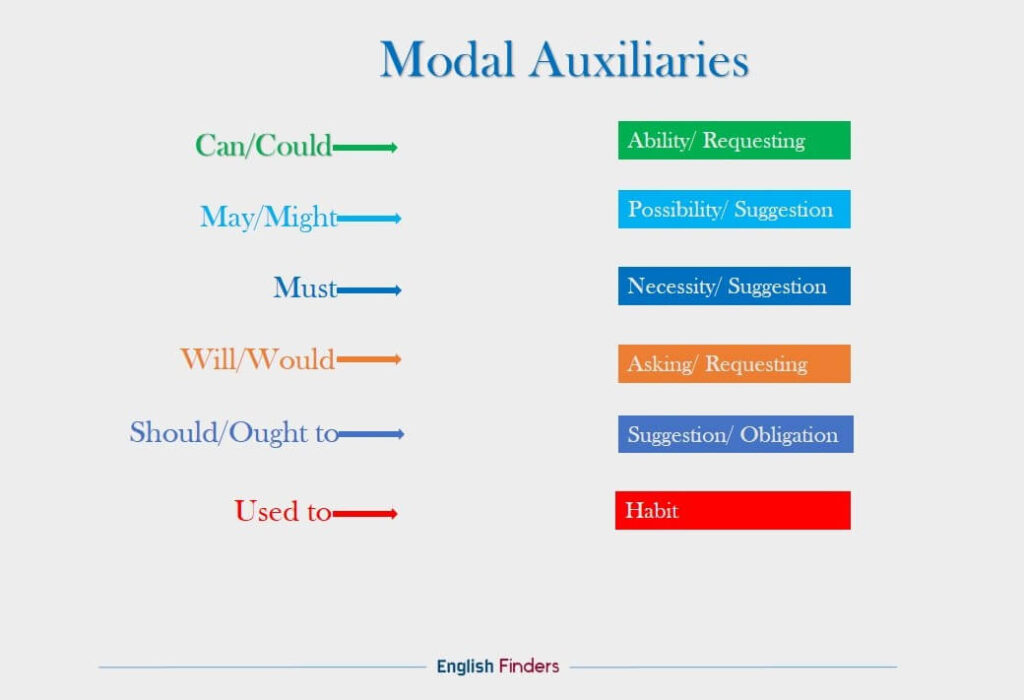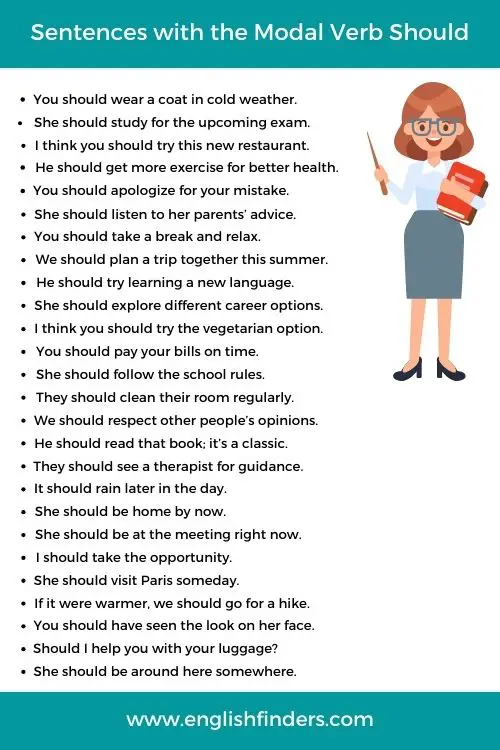Last updated on June 15th, 2025 at 09:59 pm
Modal Auxiliaries in English
Quick Navigation
Modal Auxiliaries are kinds of auxiliary verbs or helping verbs. But they are different from traditional or regular auxiliary verbs for several reasons. The main difference between modal auxiliaries and common auxiliaries is that modal auxiliaries do not change their primary form. In contrast, common auxiliaries can change their main form according to the use of tenses.
Let us see the definition of the modal auxiliary verb in English. A modal auxiliary verb is a helping verb that describes the mood or manner, such as ability, possibility, permission, obligation, necessity, etc. Let us see some examples of modal auxiliaries:
Modal auxiliaries are underlined for easy identification:
- I can help you.
- He could go there.
- You may make your decision.
- They might approve the agreement.
- She must avoid bad things.
- I used to meet them.
- Mr. Kopil should face the challenge.
- You ought to obey your responsibility.
Let us see the functions of modal auxiliary verbs with examples in the table below:
| Modal Auxiliaries | Functions | Examples |
| Can | Ability | I can solve the math. |
| Could | Ability, requesting | Could you help me to make a study plan? |
| May | Possibility, prayer, permission | May I drink a glass of water? |
| Might | Possibility, suggestion | He might go on a trip. |
| Must | Obligation | You must take responsibility. |
| Will | Asking | Will you give me a book? |
| Would | Requesting | Would you allow us to visit the place? |
| Should | Suggestion | They should concentrate on studying. |
| Ought to | Suggestion, moral obligation | You ought to change your bad habits. |
| Used to | Habit | I used to meet my friends every evening. |
Usage of Modal Auxiliaries
Let us see how we can use different modal auxiliaries in our everyday life:
Can/Could
They are both used to express ability, capability, or request. Examples are in the following sentences:
- I can play football.
- You can take your dinner.
- He can make my dream come true.
- Can she make good food?
- They can fix the issue.
- Mr Lenin could see you.
- We could miss the chance.
- Could you help me fix the problem?
- She could help you.
- The teacher could take the class.
May/Might
They used to express possibility, prayer, suggestion, and obligation. Examples are in the following sentences:
- You may go there.
- He may come here.
- They may choose the topic.
- She may accept it.
- May I accept the challenge?
- He might offer you a good facility.
- You might take it normally.
- They might make the decision.
- Salina might join the program.
- Kamal might offer you a new proposal.
Must
‘Must’ usually expresses certainty or suggestion. Examples are in the following sentences:
- You must do this.
- They must attend the meeting.
- We must respect our parents.
- He must stop bad habits.
- She must take a break.
Will
‘Will’ is used to express future action or ask for information. Examples are in the following sentences:
- I will buy a smartphone.
- Will you give me a pen?
- He will take this opportunity.
- Will they help themselves?
- Will you make my day happy?
Would
‘Would’ is used to express requesting or mentioning past habitual facts. Examples are in the following sentences:
- Would you lend me a book?
- I would like to play football.
- He would buy a book.
- Would he make a new plan?
- Would you like to join the party?
Should/Ought to
‘Should’ or ‘Ought to’ is usually used to address suggestions or moral obligation. Examples are in the following sentences:
- You should give up bad habits.
- He should study properly.
- They should be present in the classroom.
- We should obey our parents.
- She should accept the real situation.
- You ought to be present there.
- He ought to take proper treatment.
- They ought to understand the true facts.
Used to
‘Used to’ usually indicates habit. Examples are in the following sentences:
- I used to wake up early in the morning.
- He used to play cricket.
- She used to walk in the street.
- They used to participate in different types of programs.
- Mr Labib used to sing beautiful songs.

Azizul Hakim is the founder & CEO of englishfinders.com. He is a passionate writer, English instructor, and content creator. He has completed his graduation and post-graduation in English language and literature.




